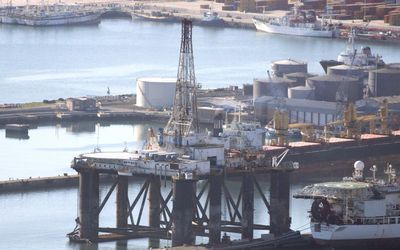Source:

Libyan government in deal to end blocking of oil ports
by Benoit Faucon
2016-08-01 15:41:55.0
NEW YORK —Libya’s state-controlled National Oil Company said it was taking steps to restart exports from three blocked oil ports after the government reached a deal with local guards who had blocked the facilities during a pay dispute.
The deal could help revive Libya’s sagging oil exports, which have been curtailed as various factions fight for control of this North African nation.
In a statement on Sunday, National Oil said it "unconditionally" welcomed a deal between Libya’s unity government and the petroleum facilities guards (PFGs) to reopen three eastern ports.
The guards, an autonomous force that operates like a militia, had blocked them for 18 months, claiming they were not getting paid.
The state oil company said it "will now start working" to resume exports, including calling back staff to work and talking to international oil buyers. But it warned there were still security and political obstacles before the first ship can be loaded, without providing more details.
Higher production from Libya would add more oil to a global glut that has seen prices drop by more than half since mid-2014. After a recent oil price rally, prices have again sagged due to resurgent production in Africa and the Middle East.
National Oil chairman Mustafa Sanalla, who had opposed tying monetary payments to PFG leader Ibrahim Jathran in return for guards reopening the ports, said he received guarantees from the country’s presidential council that no improper payments would be made.
"I am pleased the presidential council agrees that we cannot reward individuals who hold Libya’s oil hostage," Sanalla said in the statement on Sunday.
A PFG spokesman confirmed a deal had been reached but did not return a request for comment on its content. A presidential council adviser on oil matters did not return a request for comment. A National Oil spokesman declined to comment.
The three ports set to reopen — Zueitina, Es Sider and Ras Lanuf — have the capacity to export over 600,000 barrels a day. But they may not be able to load more than 100,000 barrels a day because of attacks by Islamic State and other armed groups, Sanalla said in a recent letter to the UN.
The letter also complained about the risk of improper payments to Jathran. A spokesman for Jathran declined to comment on Sanalla’s allegations but said a "key issue that was resolved was over two years of back salaries due to the PFG".
Overall, National Oil said nationwide oil production could increase by 150,000 barrels per day (bpd), from about 400,000 bpd, within two weeks, thanks to fresh government funding.
Provided talks with other groups that have blocked output in Southern oil fields bear fruit, nationwide production could more than double to 900,000 bpd, it said.
More Africa news from The Wall Street Journal
More news from The Wall Street Journal
Premium access to WSJ.com: $1 a week for 12 weeks

Picture: SUNDAY TIMES
NEW YORK —Libya’s state-controlled National Oil Company said it was taking steps to restart exports from three blocked oil ports after the government reached a deal with local guards who had blocked the facilities during a pay dispute.
The deal could help revive Libya’s sagging oil exports, which have been curtailed as various factions fight for control of this North African nation.
In a statement on Sunday, National Oil said it "unconditionally" welcomed a deal between Libya’s unity government and the petroleum facilities guards (PFGs) to reopen three eastern ports.
The guards, an autonomous force that operates like a militia, had blocked them for 18 months, claiming they were not getting paid.
The state oil company said it "will now start working" to resume exports, including calling back staff to work and talking to international oil buyers. But it warned there were still security and political obstacles before the first ship can be loaded, without providing more details.
Higher production from Libya would add more oil to a global glut that has seen prices drop by more than half since mid-2014. After a recent oil price rally, prices have again sagged due to resurgent production in Africa and the Middle East.
National Oil chairman Mustafa Sanalla, who had opposed tying monetary payments to PFG leader Ibrahim Jathran in return for guards reopening the ports, said he received guarantees from the country’s presidential council that no improper payments would be made.
"I am pleased the presidential council agrees that we cannot reward individuals who hold Libya’s oil hostage," Sanalla said in the statement on Sunday.
A PFG spokesman confirmed a deal had been reached but did not return a request for comment on its content. A presidential council adviser on oil matters did not return a request for comment. A National Oil spokesman declined to comment.
The three ports set to reopen — Zueitina, Es Sider and Ras Lanuf — have the capacity to export over 600,000 barrels a day. But they may not be able to load more than 100,000 barrels a day because of attacks by Islamic State and other armed groups, Sanalla said in a recent letter to the UN.
The letter also complained about the risk of improper payments to Jathran. A spokesman for Jathran declined to comment on Sanalla’s allegations but said a "key issue that was resolved was over two years of back salaries due to the PFG".
Overall, National Oil said nationwide oil production could increase by 150,000 barrels per day (bpd), from about 400,000 bpd, within two weeks, thanks to fresh government funding.
Provided talks with other groups that have blocked output in Southern oil fields bear fruit, nationwide production could more than double to 900,000 bpd, it said.
More Africa news from The Wall Street Journal
More news from The Wall Street Journal
Premium access to WSJ.com: $1 a week for 12 weeks





















